- Home
- Carol Bruneau
A Circle on the Surface Page 6
A Circle on the Surface Read online
Page 6
“Yes, Hannah? What can I do for you?” Mrs. Finck’s voice was almost spiteful. The poor thing cowered. God, you had to pity anyone doomed to living with a fellow best known as a bootlegger, down there in his shack below the cemetery.
Can’t spell her own name, Win Goodrow had suggested.
Mrs. Finck picked through the candies, popped one into her mouth. Turned a forced smile Una’s way. “That truck—what the bejeezus is keeping him, do you suppose? At least you brought the sunshine with you, Missus—that’s something—wherever it is you’re from.” It was as if Una had only just arrived. “Isn’t it uncanny?” Mrs. Finck licked back a bit of sugary drool.
“Pardon?” Una smiled at Hannah, who edged closer, clasping a tin of pears.
“The lack of fog, of course. Got something here for Uncle,” Mrs. Finck spoke over Una’s head, “but you got to sign for it.” The shopkeeper eyed Una again, rubbing her throat, and said chummily, “Seen Enman and them putting out earlier. Off to town, are they?”
Una stepped aside to let Hannah pore over whatever had been slapped upon the counter, a bill or some other piece of mail. She couldn’t help but study the dullness of the girl’s hair where it parted at her nape. It looked recently trimmed, with a ruler as guide but at a slant that made her even more childlike.
“Hannah, my darling,”—Mrs. Finck rolled a pencil forward—“Hell western-fried, girl, I don’t have all day.”
You could hear spit rattle and the gritting of teeth as Hannah gathered herself. Such pretty teeth, Una might’ve complimented the girl, if she hadn’t already heard the story of the dentist yanking out the old ones and replacing them. A story with the sorts of details you preferred to be spared.
“Now look, you’re holding up Missus. It’s not like I’m asking you to write me a goddamn book. No ‘x’, no mail.”
Hannah’s raw-looking hands paddled the air. A thread of saliva dangled from her lip before she could lick it away. “Uncle will be so mad, he’ll he’ll he’ll—”
Mrs. Finck thumped the counter. “For godsake, girl.”
The sounds Hannah made prompted Una to reach out and pat her arm. She thought of the girl her mother had hired once to help the cleaning lady. “It’s just a piece of mail, dear.” She squeezed the girl’s hand, her right one. It felt sticky as a small child’s mucking around with mucilage.
Somehow Una managed to angle the pencil between the correct fingers of Hannah’s right hand and, clasping them in hers, traced H-A-N-N-A-H on the form. “There you go—what a pretty name. A palindrome.” She eyed Mrs. Finck, who glowered.
Hannah had quit whimpering. “There you go,” she echoed, and snatching the mail—notice of a fine, a summons, whatever it was—stuffed it under her shirt and fled.
“In case you forgot, it’s a business I run here, not a classroom, Missus.” Mrs. Finck’s speckled hand seized and weighed Una’s letter. Her anemic tongue licked the stamp and her bony fist thumped it into place, then, finally, on top of the pile Una’s missive landed—as unceremoniously as that.
Maybe Una should have kissed it first, offered up a wish-upon-a-star.
“Truck’ll be here in a jiffy. A good fella, your Enman, given all he puts up with. A good fella’s hard to find, isn’t that right, Missus.”
Outside, Hannah knelt over the Meades' dog lolling in the dirt. Her face pressed to Chubby’s mangy fur, she stroked his muzzle and with her left hand counted his whiskers.
Of course! Una should have asked if the girl was left-handed.
Chubby’s eyes rolled up at her, begging her to join in. She gave his chin a perfunctory scratch.
“Out spending Enman’s dough, are youse?”
Sylvester Meade leered down at her. He was with his grandson. Both acted as if Hannah wasn’t there, or that the girl’s petting their dog showed an awful presumption. “And where’s he off to this morning?” Sylvester aimed this at Una’s chest, yellowy eyes lingering there as the boy disappeared into the store.
Smoothing her skirt, she smiled coldly. You couldn’t turn sideways without somebody around here taking notes.
Righting himself, Chubby proceeded to hump a tuft of weeds. Una found his doggy antics both amusing and embarrassing as Meade kept up his patter—“Gonna be another hot one, eh?”—all the while slathering her with his gaze. Eyes cast downward, Hannah backed then slunk away and started running.
With the day to kill, Una took the path around the bog and up along the barrens. The road looped below, meandering beyond the graveyard to the last house, Twomey’s. A lone figure loped along it—Hannah?—and Una watched her progress until, at the edge of a thicket of wild pear, she caught a flash of movement.
A doe and its faun.
Deer had made short work of Mrs. Greene’s tulips that spring. The creatures snacked on the scabby apple trees near the churchyard. Funny thing, though, they avoided the cemetery with its lofty wooden cross and carved Jesus, the graves—including Mrs. Greene’s fresh one—hemmed by a spruce hedge. A person could end up in a cruder place, Una supposed. The graveyard was the first and last thing you saw coming and going from Barrein, if you drove the coastal route that hugged what seemed like an endless series of coves and bays.
Other than taking this long, meandering road or travelling by boat, the only remaining option was driving the dirt track that cut straight inland through miles of scrub forest to link the village to O’Leery, which lay near Halifax’s distant outskirts. Barely wider than a path, the track crossed a wilderness pocked with lakes and bogs, a spruce-studded purgatory—or a hunter’s paradise, depending. If it moved you shot it, was the attitude of a Barreiner. Her idea of game? A duck waddling around the Public Gardens’ pond or served à l’orange in the dining room of the Lord Nelson Hotel. The thought of both made her throat tighten. Right about now Enman would be showing his books to a roomful of nicely dressed men cringing at the Inkpens’ double negatives and “I seen ya’s.” At least Mrs. Greene had made some effort to pass down proper grammar, though how she had succeeded when Enman was surrounded by butchered language all through his childhood was a mystery.
Alcohol on Enman’s breath, dust on the tips of his brogues: Una imagined these too. But she preferred to remember spotting him for the first time, his fedora bent to a November gale as they passed each other on Duke Street. He was going uphill, she was going down, bound for the shops in the streets below. It was after school, the lesson on identifying planes fresh in her mind. Rick Gregory, the science teacher, had come in to help out on details: Stuka dive-bombers with their hideous sirens, Messerschmitts and Condors. The information had been a bit overwhelming, as she had been more focused on Mr. Gregory’s grin, his invitation to meet for a movie. She was off to buy a dress for their date.
Nobody had told her Gregory was married.
The heavy-set man in the fedora, a man not in uniform but imposing still in his navy-blue overcoat, had smiled and nodded. He had kind eyes and a more dignified look than Rick Gregory, who, with his shirtsleeves rolled up, had nice arms.
Who could have guessed that over the Christmas holidays the same man would glide up and introduce himself at the Egg Pond, where Una was skating to forget her troubles?
After the movie, things with Gregory had gotten cosy, escalating when she brought him home to her flat. He was funny, he was charming, so she didn’t object when he put his hand under her skirt, and the rest of the evening proceded from there—why would she have objected? It was only later, in the staff room, that she learned he had a wife.
Someone, Una had never found out who, reported the affair, no more than a fling, to Mr. Sarty, the principal. One minute she was in the classroom having the kids colour in mimeographed outlines of holly and bells, the next she was in the office being given her marching orders. They took into consideration Una’s years of service and her firmness in the classroom, and she was allowed to complete the final week, be
fore Christmas. She had hoped to take her class skating on the last day of school. But this was denied her.
Gregory got off with a reprimand. So Kit, Una’s friend on staff, said.
She missed this group of kids in particular, missed in general the mustard-and-sweat smell of packed lunches, erasers, and chalkdust, missed the soft shabby feel of the textbooks—particularly the grade five geography textbook featuring exotic tribes and locales. It gave each people and their homeland a face: Juan of the Pampas; Bunga and the pygmies of the Congo, who made dugout canoes and shot game using blowguns.
The sun beating down on the road and over the barrens burned Una’s shoulders. Now her work, she realized with a chilly resolve, was making Mrs. Greene’s house a temporary home. Surely by the end of August Barrein would be behind them.
She wasted no time changing into the same blue bathing suit, throwing her clothes on over it. Enman had bought the suit on their last outing to the city in mid-May, more than a month before Mrs. Greene’s passing. “Sweet, isn’t he,” the saleslady had whispered as he watched Una model several options. She was the same saleslady who had waited on them in February, and drawn Una’s attention to the coat she fell in love with. Its woollen fabric was an unusual shade of blue, not quite cornflower and not quite periwinkle but somewhere in between, with buttons even more irresistible. They were jet black with tiny circles of mother-of-pearl set into their centres.
“Exquisite, aren’t they?” the saleslady had cooed, positively covetous. “You don’t see buttons like that every day.”
“You sure don’t.” Fingering each one, Una had tried to resist their temptation, telling herself she didn’t need the coat. “En? Honey? What do you think?” It was the first time she addressed Enman that way in public. Before she turned to him, he had his wallet out.
Venturing down the lane, Una breezed undeterred past Win and her osprey eyes, found the dirt track to Shag’s. Dragonflies—darning needles, Mrs. Greene had called them—stitched the boughs of spruce in a grove where moss absorbed the sunlight. Her footsteps drummed the dry peat. The thought of Mrs. Greene’s voice drummed too, a memory of the old woman musing about the possibility of grandchildren. Guessing that “even” Isla Inkpen would grow to enjoy having a grandchild, once she got over having an unwed daughter. People find worse things to fret about, Enman’s mother had said.
The sun had a ways to go before being directly overhead. Towards the tip of the headland the path hugged the rocky cliff. At low tide she could have climbed down and picked her way to the sand, but now the tide was coming in. It would rise and fall again by the time Enman returned to tend his flowers and sleep off his excursion, which she supposed would involve drinking.
Mounds of kelp buzzing with flies dotted the beach. She stepped out of her espadrilles, cheap things, and followed the surf as it washed the sand. Mixed with froth, it was like cream of wheat coming to a boil. The sea itself was the colour of the Caribbean in a postcard Kit sent once. Una had never been south of Boston. The water resembled stained glass, so clear and calm you could see the drop-off. Shag’s Cove was the one thing that made Barrein bearable, unless you were like Enman and could be content buried in a ledger or music. The swoony symphonies and hick tunes he played along to—the hick tunes against his will, he claimed, Wilf Carter yodelling about ponies and so forth. Records that strange old bird, Hubley Hill, had brought over just this week, trying to talk Enman into playing another dance. The first time Enman had taken his violin out in front of her, she had been forced to smile and bite her tongue. Within days of arriving at Eastertime, Enman had played with Hubley at a dance in the church hall, the duo hastily billed as the Steady Hills. Mrs. Greene had still been well enough to get in and out of bed, and Una had gone along, more to avoid being left at home than to enjoy the music. The first time Enman had played for her, he had butchered a Bach aria—her just desserts, Una supposed, for the meal she had fussed over yet still managed to ruin. They had laughed off both their failures, making a conciliatory beeline for Diana Sweet’s. The dance, however, was less amusing. Una stuffed her ears with toilet paper, waiting for it to end. Since then, as far as Una could tell, Enman seemed happiest playing along to the hi-fi before nodding off to sleep to the thud of the needle bumping round and round.
As she stripped to her suit, she imagined the superintendent opening her envelope. At Mrs. Greene’s wake Kit had mentioned the position in town, a high school vacancy—a long shot, but still. Perhaps when seeking someone to teach older students the board would make allowances. With any luck, Mr. Sarty the principal would continue to keep Una’s firing to himself, as he had promised. Once the war ended and with it all the shortages and overcrowding, once life got back to normal, they would be crying for teachers. They would have to change the rules. Someday she might have a child and a job, and someday men like Rick Gregory might even get their wrists slapped. Enman would have his old job and they would live near Quinpool Road again, hear the Birney cars trundling back and forth under the trees’ leafy canopy. So much for his distressing hints that he preferred Barrein and that if she gave it more of a chance, she would come to prefer it too. He would see, he would remember, that living in town was, as Kit said, the cat’s ass.
Meanwhile, might Mrs. Finck spill the beans, asking Enman what he made of his little wife writing the school board?
September was only a month and a half away.
Sucking in her breath, she relished the tautness of cotton hugging her waist. Maybe having the perfect suit guaranteed that by summer’s end it would no longer fit? This seemed the way things worked. Ask for one thing, get the opposite. Feast or famine, Mrs. Greene had said about life’s blessings. In a month’s time she might well have a job in the city and then what? She would figure it out. They would figure it out. And who knew but the new suit and the letter would work in tandem to make real this heart’s desire—a baby.
Feeling buoyed, she entered the shallows as if stepping through glass. The water’s iciness reminded her of December, just after Christmas. How Enman had skated up to her on the frozen pond and asked her name, and how she had poised the blade of her skate and etched a tiny line in the ice, the numeral one. “Une for Una.” Obviously charmed, he’d bought her hot chocolate. He had touched her elbow gently, guiding her from the rinkside canteen to a bench.
Now she held her breath, waded to her waist, ducked. The cold slammed against her eardrums. It pinched and twisted every nerve. Might it be enough to stop the heart? In a weaker person perhaps, out deep enough. Such cold had not stopped Enman’s heart after the tanker’s winter sinking.
In the frigid air on the Commons, removing his skates, hiking up a pantleg, he had shown her one of his scars. He worked at the Bank of Nova Scotia, he said. His nose dripped slightly. She said she was on a “small hiatus” from work and in describing her job, mentioned how much she enjoyed it but loathed giving the strap, blushing when he said, “That shows how sweet you are.” She knew he was reasonably well off, by his clothes and his refined way of speaking.
Bobbing on a gentle swell Una fixed her gaze on the distant lighthouse straight ahead, its stripes red as the tiny lines and numbers on her thermometer. She had told Enman a lot of things about herself, but not about Rick Gregory or that she had been fired. She had made sure Enman knew of the school board’s rules before they went to bed together that New Year’s Eve, which was when he proposed. Even Kit was shocked at how quickly it all transpired.
“Marry me, Una, and you won’t have to bother with bullies. No more chalk under your nails, no more giving the strap. You won’t have to worry about work again.” Sheer relief had drowned out any reservations she had about this, since she loved her work. But work was a moot point. When he first mentioned “going down the shore,” she thought he meant Lunenburg, Liverpool, or Yarmouth, or some other picturesque town of size. Not a pile of rocks with a few houses scattered over them, twenty or more miles, as the crow flew, from Ha
lifax.
Dr. Snow preached the benefits of exercise, but maybe such a frigid swim was not so wise? Yet the water made her weightless, carefree. She was a floating paper doll until the cold bogged her down and Snow’s cautionary words about “hostile womb” left her feeling waterlogged. Now she was driftwood washing up, the sun and sand and the barbed cold pricking her all over.
Towelling off, she stretched out on Mrs. Greene’s plaid blanket, teeth chattering, and let warmth reclaim her.
These immersions caused such numbness. Testing the body’s endurance, they were a little like dying by degree, she thought. Perhaps the immersions even tempted fate, silencing each nerve before they slowly came back to life and returned her to the land of the living, the shore with its grit and brackish scent of marram and glinting mica, fool’s gold.
Wrapped in the towel, she strolled toward a flock of terns warning her away from nests amid the rocks. The rounded boulders, fringed with seaweed, resembled people’s heads, an audience of heads half submerged there. Scaling them, she made her way to the next sandy crescent and walked its length, a leisurely hike of half a mile or so, beachcombing as she went.
Not much of interest washed up here. The sea saved the good stuff for the third beach, its lagoon formed by a jut of rock as smooth as a whale’s back. Once, she had found a carpet laid out there parlour-style, its fringe beaded with periwinkles. The authorities discouraged people from scavenging for items washed from ships, a decree which seemed a bit ridiculous. Currents colluded randomly with the ledges of rock in the sea’s offing, as Enman called the section just before the horizon, to deposit the strangest things. The horizon itself looked like a line in a notebook drawn with Schaeffer’s medium-blue ink, the colour she’d made the grade fives use.

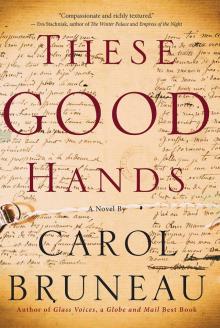 These Good Hands
These Good Hands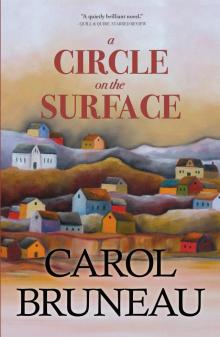 A Circle on the Surface
A Circle on the Surface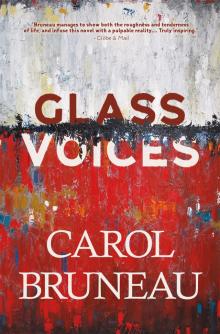 Glass Voices
Glass Voices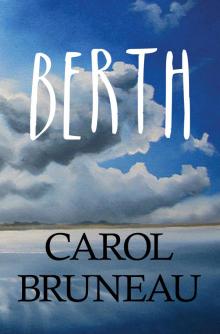 Berth
Berth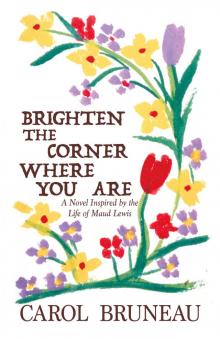 Brighten the Corner Where You Are
Brighten the Corner Where You Are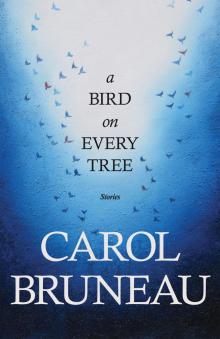 A bird on every tree
A bird on every tree